Travel
Week 15 - The Opportunities We Never Seek


I am going to start this post with a movie-related analogy.
You know in the movie Inception, when they wake up as their flight lands in Los Angeles? And how the guy who just inherited his father’s empire wakes up in utter bewilderment like he can’t quite wrap his head around what just happened?
I just watched the movie on my 11 hour flight from Auckland to Singapore, and I feel like that perfectly encapsulates the last 7 days. While no one convinced me to sell my fortune, the remainder of my time in Australia and New Zealand planted me with many new thoughts and experiences that stretched my thinking even more than this already impactful semester has.
Seven days of straight travel is too much for one blog post. I know because I wrote in all down and it was a fifteen minute read. So I’m just going to summarize the highlights.
On Monday, through an Australian friend I’ve made at NUS, I got connected with a girl in Canberra named Ez. Ez is a student at Australian National University, with a job lined up next year for the Australian government’s department of foreign affairs. She’s specialized in Australian-US relations and was a part of the youth advisory council to the US embassy in Australia.
One of the coolest things she told me was that she once gave a presentation to Caroline Kennedy (JFK’s daughter) about how the US and Australia can work together to advocate for women’s health in southeast Asia.
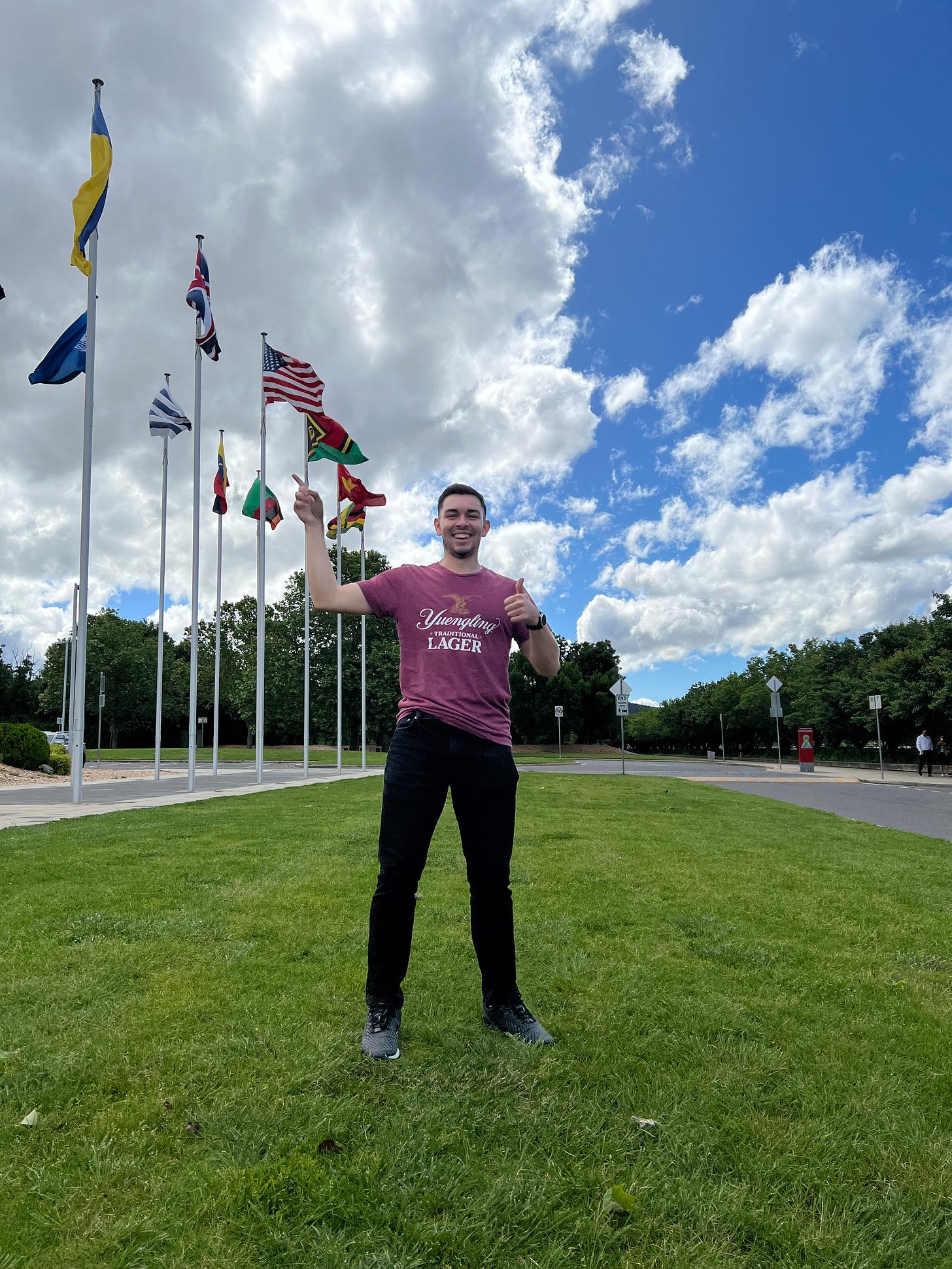
So cool! We spent the day walking around Canberra and chatting, and I met up with her friend group at a pub that night. Ez was a fantastic host, and it was so cool to feel like I was getting the inside scoop into what Australia is like for a local.
Good thing I was with her as well, because there isn’t much to do in Canberra. Twenty four hours there was almost too much time.
Nonethless, we talked for ages about so many Australian and American topics: Australian-Indigenous relations, Australia’s strategic location near Asia, Australia’s main export (coal) and differences between Australian and American culture.
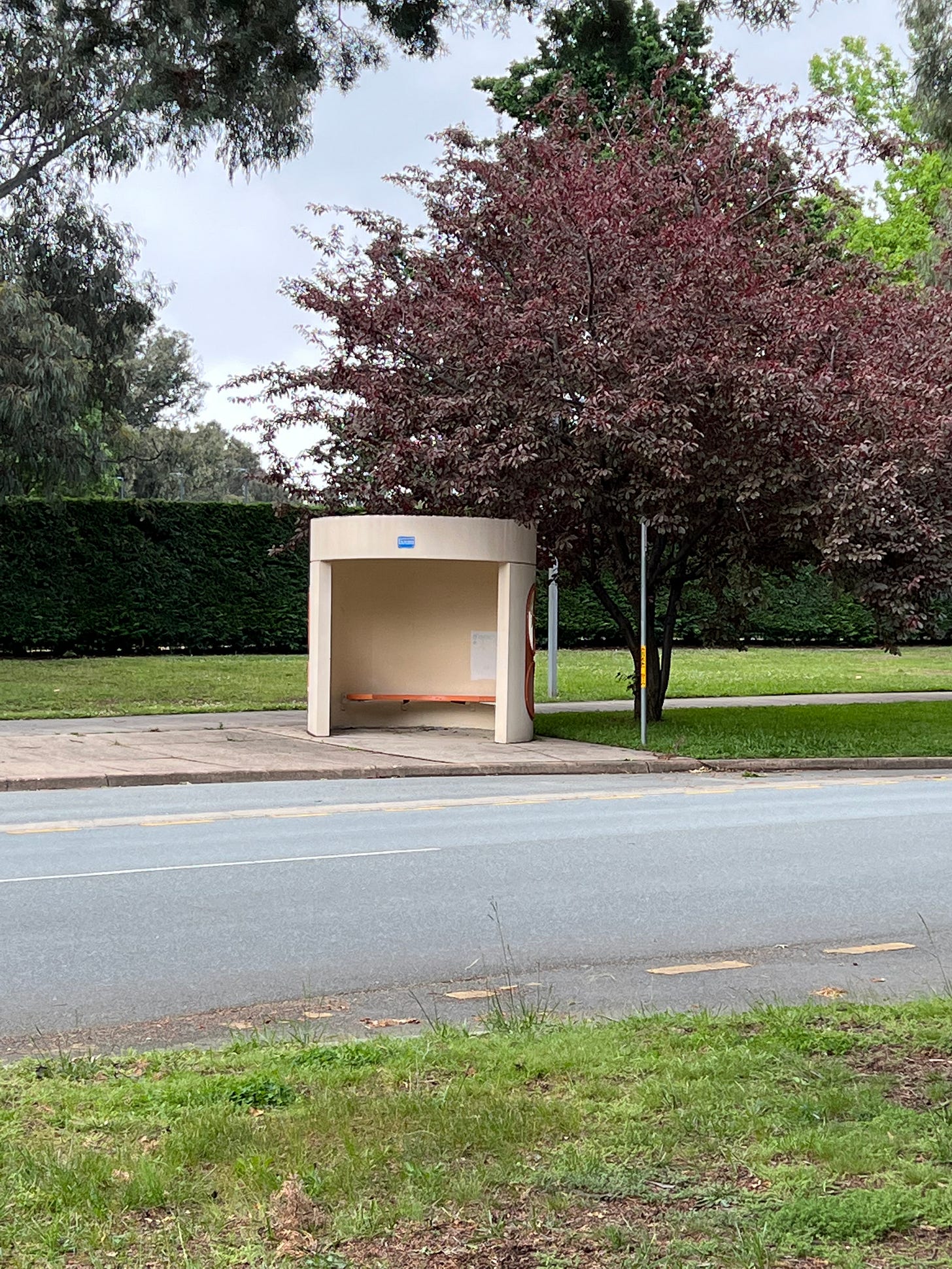
A couple days later, I touched down in Auckland, New Zealand. I had a pretty packed schedule of events in New Zealand, which I had preplanned when I thought this trip was getting funded.
It’s a good thing I planned ahead: Auckland is a pretty mid city, and everything you’d want to do in New Zealand requires driving hours away from Auckland and knowing where you want to go.
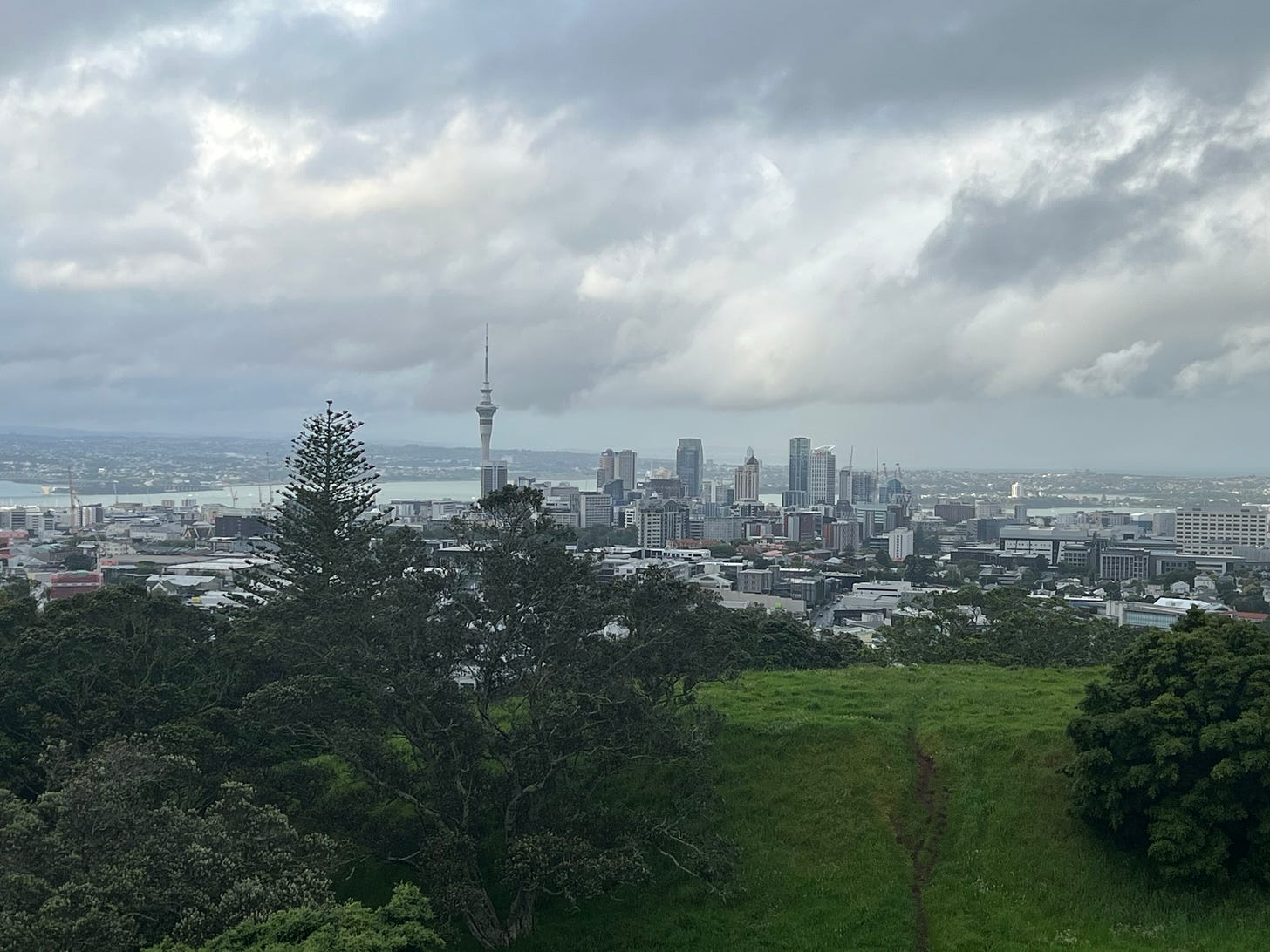
The first thing I had planned was a trip to the Waitomo Caves, a day trip away from Auckland. I took a train down to Otorohonga, which is allegedly where the Waitomo Caves are located, but it turns out that it’s the next town over.
Otorohonga has a population of 6000 and no taxi service. The only shuttle in the city was hours away driving a client, and so I had basically no way of getting the final 7 miles to my destination.
But, after talking to the woman at the coffee shop, I was directed to Fiona at the library, who directed me to Luaren at the town’s information center. A couple unsuccessful phone calls later, Lauren just decided to drive me the rest of the way herself.
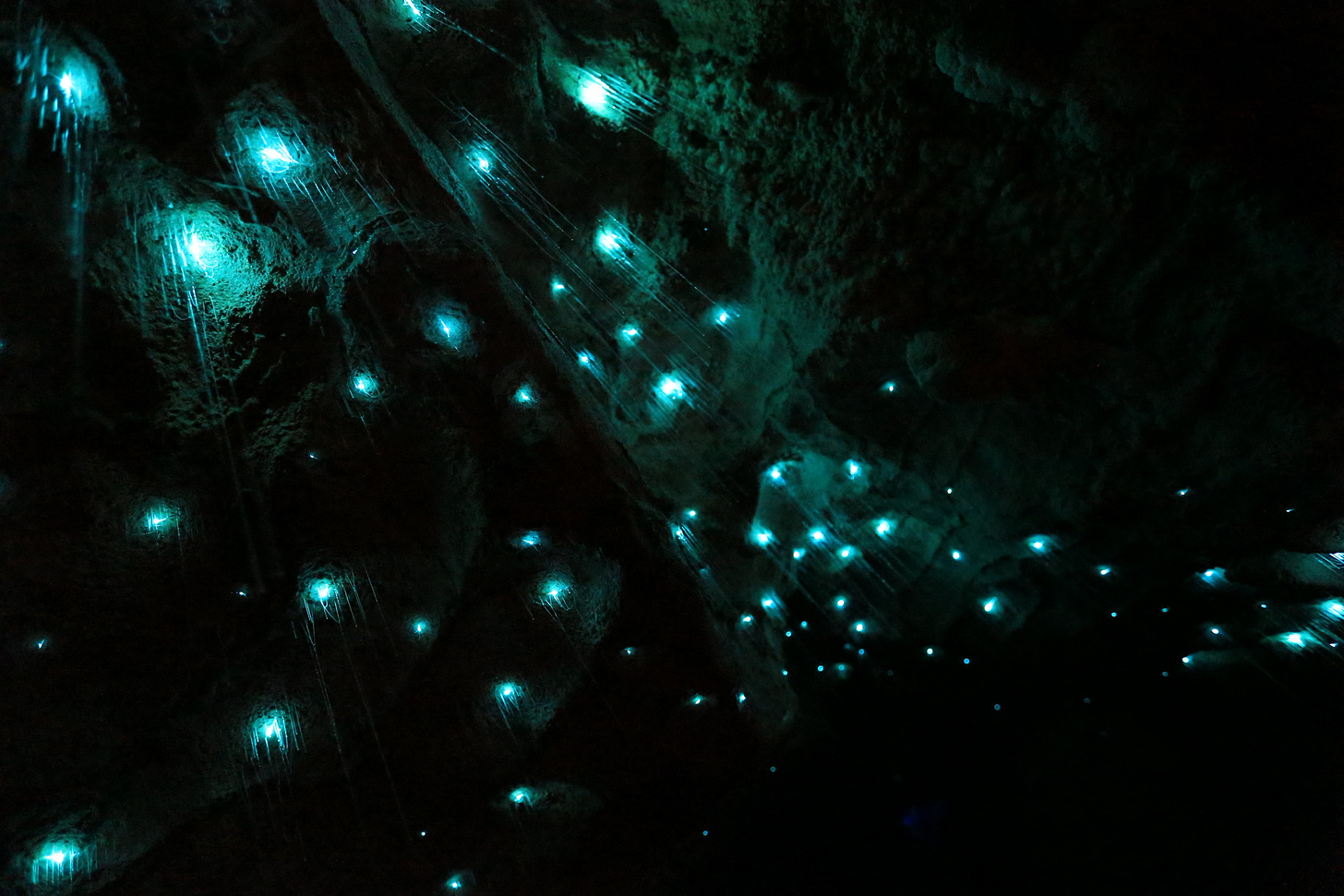
It felt like I was getting dropped off at school by a friend’s mom or something. But it was the coolest small town experience ever! The entire town—I basically met half of them—was so friendly, and I made it to the caves on time.
That whole situation made me really think hard about what I would’ve done in that situation. Growing up near a big city, there’s no shot I would’ve ever given a stranger a 10 minute car ride, from both a safety perspective and a couldn’t-be-bothered perspective.
But it goes to show how kind people are out there in the world.
I was doing a black water rafting experience so I got to jump off of small waterfalls and float in a raft down the cave as we saw the glowworms. It was pretty sick!
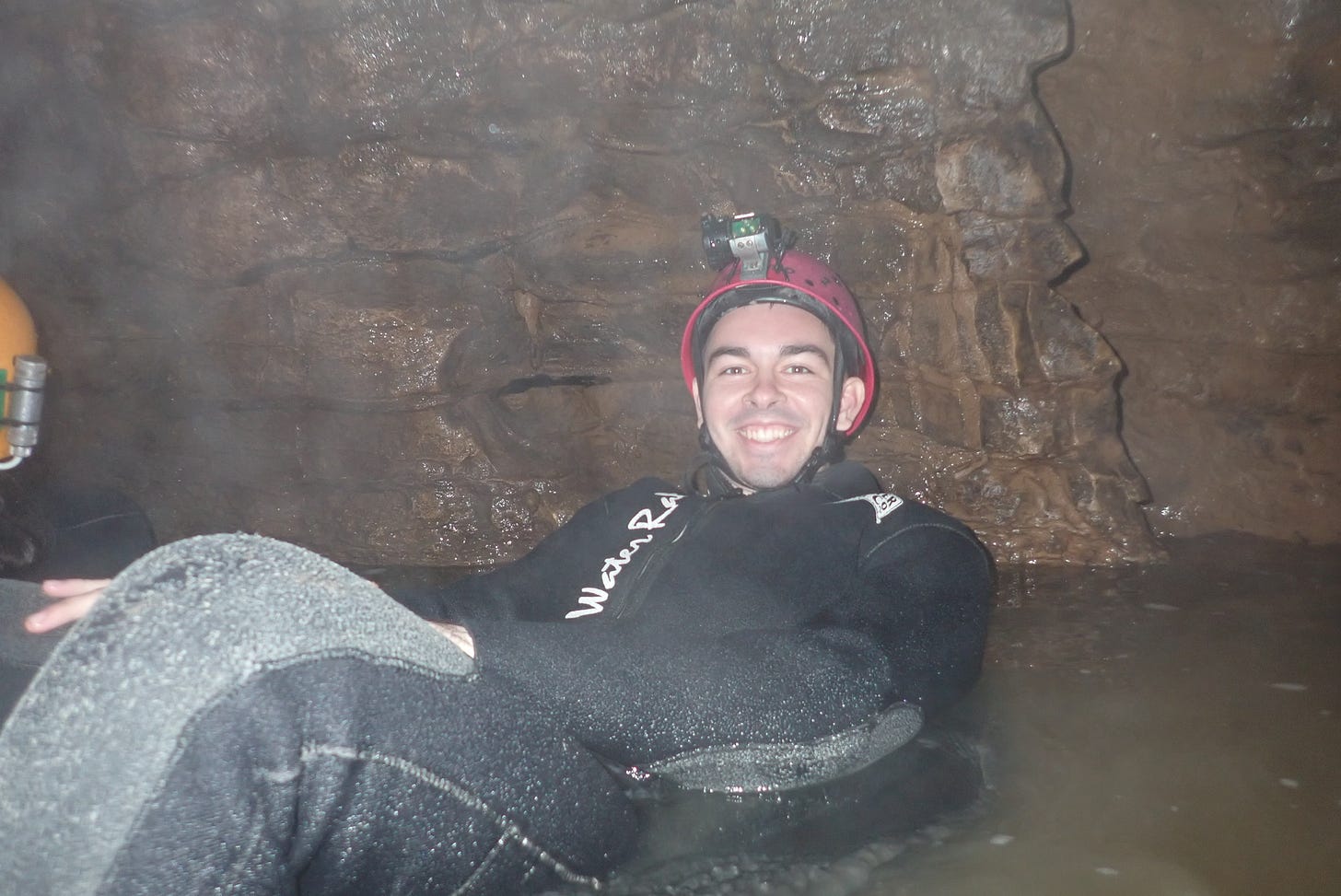
The following day I met up with people from Yes Fam New Zealand who had planned a four day meetup in Taupō, New Zealand. I only stayed for a day and a half and had a good time, but I’m going to skip over that part of the trip to keep this entry short.
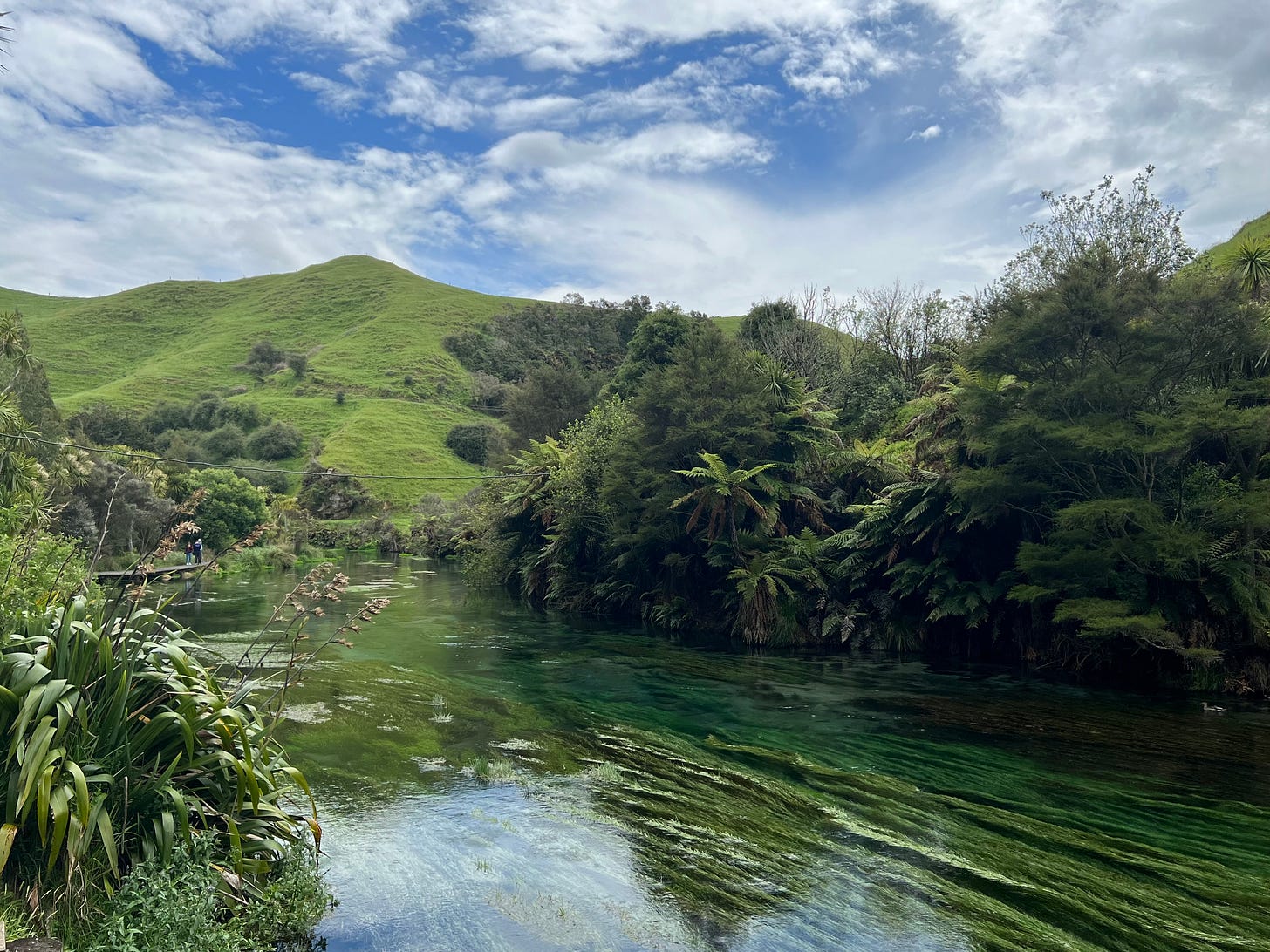
The last stop on my way back to Auckland was by far the best one. I went from Taupō to Rotorua, or as it’s more famously known, the birthplace of Steven Adams.
I’m guessing @Jai is the only person reading this who knows who Steven Adams is, and the rest of my loyal readers didn’t even bother to look it up. That’s okay.
I was in Rotorua for a Māori cultural festival, where they teach their songs, dance, and traditions to visitors. Māori is name of people indigenous to New Zealand, and they are most famously known worldwide for the Haka, the popular dance performed before war, or as of late, before sporting events.
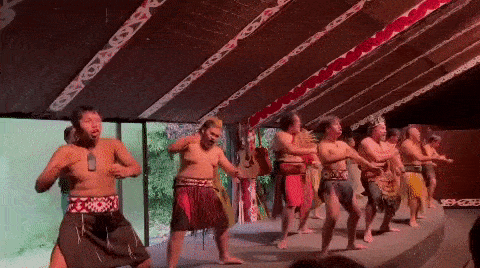
The whole experience was so cool. They showed us all parts of their culture, not just the Haka, and it included their typical greeting, games they played, love songs, and other dances. They let audience members join in, so I took part in the Haka, and this stick tossing game.
It’s safe to say that I’m a natural when it comes to handling a stick. Or two, as the game requires.
But the best was yet to come. I reached out months ago, when I signed up for this, to see if I could talk to someone from the Māori community outside the context of the performance, just to find out more about the culture and dig beneath the surface of the celebrations, to see what being Māori is like in modern-day New Zealand.
You know, because I was supposed to have this trip funded and all.
Well anyways, nobody answered my request, so I figured this sort of thing wasn’t allowed. But, as we were having dinner, one of the organizers came up to me and said she had seen my request and that I could talk to the chief of the village, if I was still interested.
Hell yeah. I immediately abandoned my 7 course dinner and, along with a girl I met from Canada who overhead the conversation and was interested in tagging along, went to another building where the chief was waiting.
Thus began one of the most eye-opening conversations of my time in Asia, if not my entire life.
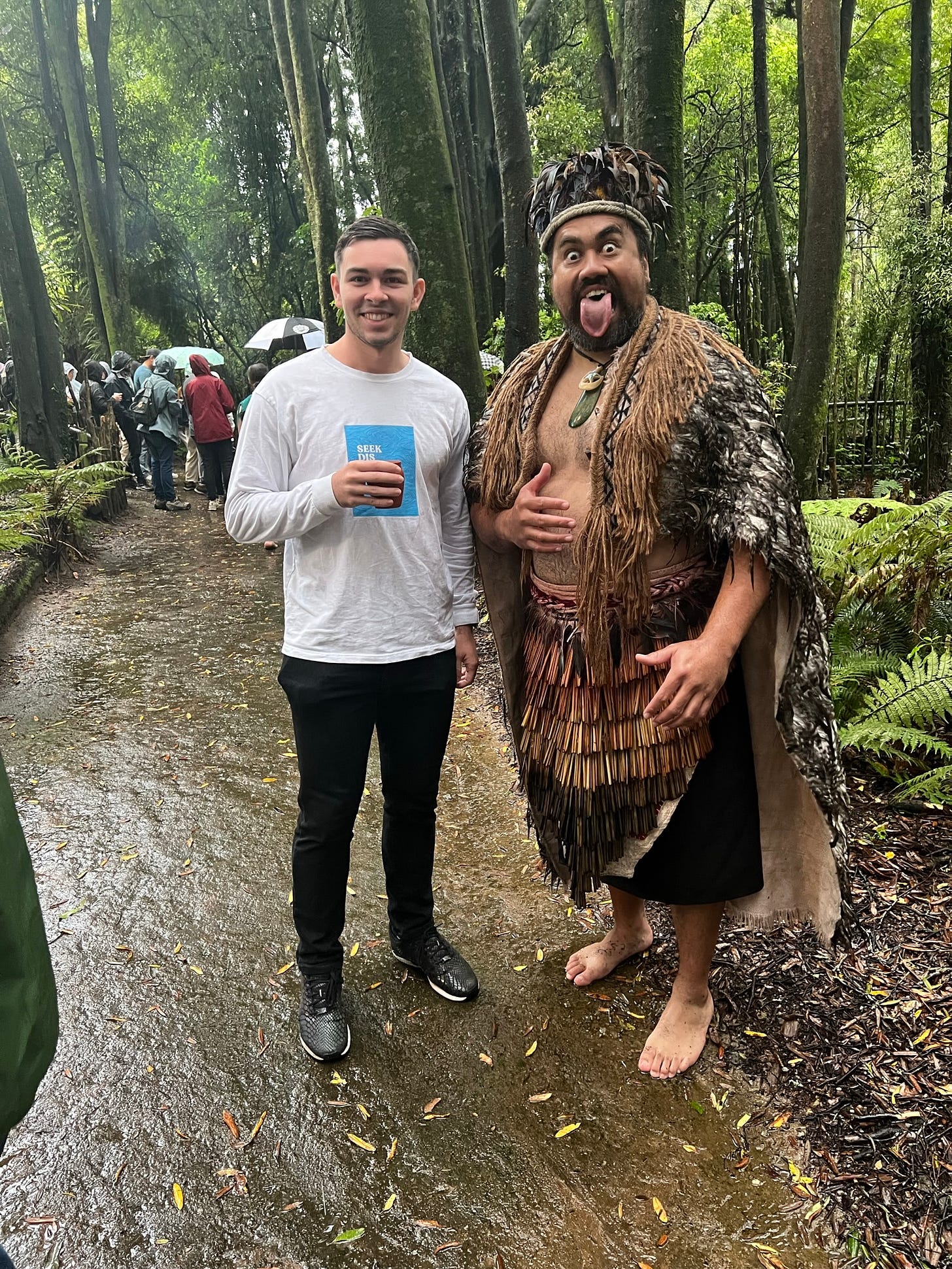
We’ve all had that feeling of emerging from a conversation a different person from when we entered. You don’t know how to describe it, and if you had to summarize your takeaways you’d struggle to do it justice. But YOU know. You know how it hit you, and the impact that will stick with you.
That was this conversastion, times 100.
I started by asking about how the Māori people fit into New Zealand as a whole, both culturally and politically. It seemed that New Zealand has done far better than the US and Australia when it comes to integrating Māori people into the modern day. They have an allocated 4 out of 20 seats in Congress* and their language is an official language of New Zealand and on all the street signs in the country (along with English).
But what I learned after digging deeper is that there is a real animosity between Māori and New Zealanders. In similar fashion to how white vs. black might be perceived in America, the same thing happens in New Zealand. Old establishment folks want to more or less hold the Māori people down, refuse to accept the culture, and vote (and vote often) against any pro-Māori legislation.
As a white guy myself, this is where the conversation began to get quite uncomfortable for me, but in the healthiest way. This is how you learn about the real problems that are out there.
Turns out in this situation however, Māori culture is actually far more respected abroad than it is domestically. As an outsider, that means there’s really little that I can do—this is a battle that I cannot really help the Māori people win. The best I could do is go to the festival in the first place—all the money from the event goes straight back into their local community.
Nonetheless, the chief has hope that as New Zealand education systems begin to teach Māori culture from a young age, older generations die off, and Māori people as a whole continue to trend towards getting leadership positions in large companies and government (as has been happening in recent years), there will be a greater acceptance of their culture and their people.
It also called to mind what the perspective of other indigenous tribes around the world must be. The public perception doing research was that New Zealand-Māori relations were far better than, say Australian-Aboriginal relations or US-Native American relations. So I can only imagine the resentment those groups feel in comparison to Māori people.
I could go on for pages about our talk, but that’s a decent high level summary. It was hands-down the most impactful conversation I’ve had abroad, and I’ve had some good ones. This one genuinely pushed me out of my comfort zone to even sit down and listen to someone speak with such passion out of a feeling of oppression.
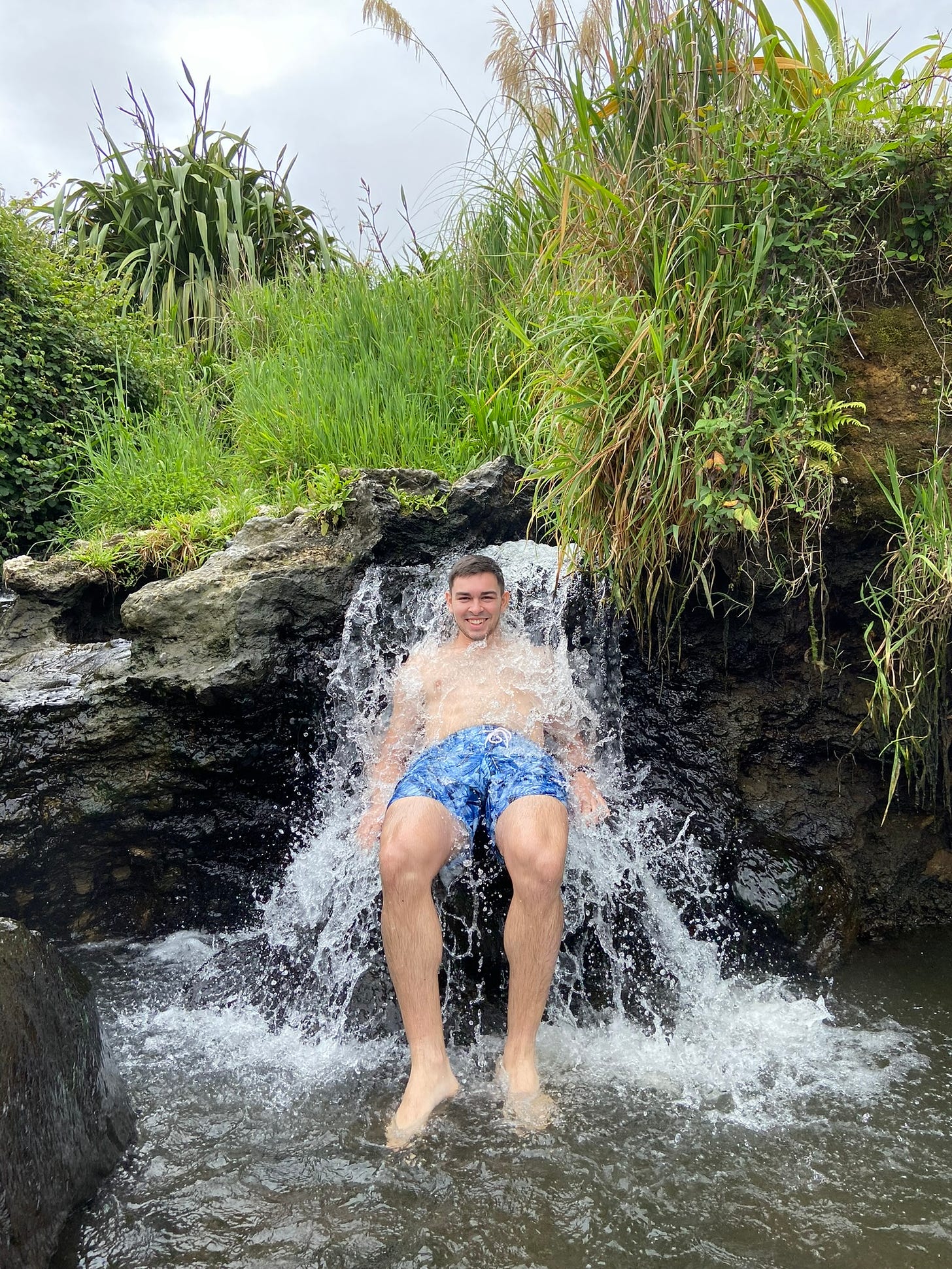
If there’s one thing I learned this week, it’s how rare it is that we genuinely seek out these conversations that can so wholly reshape our perspective on someone, despite those conversations often being right under our nose.
Even while being interested in the topic, I only reached out to have this talk because I thought I was going to have to write a 20-page research paper on this trip.
But if the opportunity is there—and it often is in some way or another—we, as curious, open-minded people need to do a better job of seizing the chance to learn something ground-breaking. This was a tourist attaction for crying out loud! But for me, it turned into something so much more.
Like the Māori chief told me as we concluded our conversation, there’s an old Māori saying that translates “If you don’t ask, you’ll never know.”
Ain’t that the truth.
*Disclaimer: After researching it seemed like there were 120 seats available in New Zealand Parlaimant and the Māori party currently holds 2 seats. However, he indicated in our conversation that a lot of Māori people also chose to join the Labor party, which holds 65 seats. So not sure where he got his numbers from, but the point is that representation exists, at least to some extent.